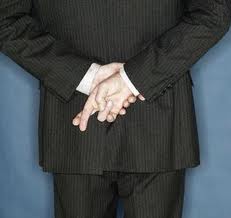
Trust is the key for every relationship. Once trust is gone, it can be really hard to get it back. Customers are not going to spend their hard earned money at a business that cheated them, lied to them or was rude to them. For example, my mom went to a McDonald’s a few years ago around Christmas time. She ordered her food and it came out to be around $6. She paid with a $20 bill but the cashier gave my mom change as if she paid with a $10 bill. The employee kept the extra change. So to this day, my mom refuses to go back to that McDonald’s.
Wal-Mart is another example of a relationship without trust. Wal-Mart’s poor treatment of its employees is starting to negatively impact its bottom line as customers abandon the superchain’s unstocked shelves, disorganized stores, and long waits for help. Where are the customers? According to Bloomberg they fled Wal-Mart’s poor customer service for places like Costco (Jones, 2013). Even my sister-in-law will not shop at Wal-Mart.
Former Johnson & Johnson Chairman and CEO Jim Burke got it right when he said that no relationship works without trust.
Source: Jones, Sarah. (2013). Customers Abandon Wal-Mart As Their Treatment of Labor Wreaks Havoc on Sales. Retrieved from http://www.politicususa.com/2013/03/26/wal-marts-treatment-labor-wreaks-havok-sales-costco-boost.html
Dear Dr. Green,
Wow! This post speaks to me. I am now thinking of all the times, companies received my business based on the trust that was formed and how many companies lost my business for the lack of this trust. As stated in one source,”trust is defined as customer confidence in the quality and reliability of the services offered by the organization” (Garbarino & Johnson, 1999).
Okay, classmates, I am not afraid to admit I am a frequent customer of the home shopping network. Yes, that is correct. The truth is, I am such a loyal customer and such a trust has been built between them and I- that often times, some of their policies (e.g. return policies) are applied very loosely to me. Now, I certainly do NOT abuse this right. However, there were times, when I indeed had a good enough excuse and kindly received a response that started out something like this, “Well, we see you have been a loyal customer for years, so we will waive this….”
It is important to note, however, that trust is a two-way street. Yes, as a buyer we should be able to trust the seller, but also as a seller you must trust your buyer. The trust formed between HSN and I is not just due to the fact that I have been purchasing from them for years, but due to the fact that I do respect the company, its policies, and its representatives. No trust is formed without respect.
So, what is the point to my embarrassing disclosure? That companies like HSN have kept my business for years, simply due to the (mutual) trust that is formed. It makes a world of a difference in terms of purchasing. Delta airlines on the other hand…Well, that is a different story for a different day.
Garbarino, E., & Johnson, M. (1999). The different roles of satisfaction, trust, and committment in customer relationships. Journal of Marketing, 63(2), 70. Retrieved from http://web.cerhum.es/wp-content/uploads/2010/12/paper7.pdf
Rania,
Thanks for the personal testimony of trust (i.e. purchasing from HSN). Each of us have our trust limits. However, businesses must be able to build common trust in all good paying customers. How?
Professor Green
One experience that comes to mind when I think of was in the ski season of 2012 and I was leaving for a big ski trip to Colorado. I brought my skis in to get worked on before the trip, which I was leaving on the next morning. They said they could not get my skis done that fast. One employee noticed me and said he would be able to work on them today. On top of that he was able to meet me in my hometown with my skis so I didn’t have to make an extra trip. I told the employees boss of the extent his employee went to, to make sure I had everything I needed in a timely manner for my trip.
That employee earned my trust for the entire company and now I will never shop anywhere else. [1]” It is the relationships we forge—and the trust we create—that matters most to our success at the end of the day” (Williams, 2013).
[1] Williams, D. K. (2013, June 20). [Web log message]. Retrieved from http://www.forbes.com/sites/davidkwilliams/2013/06/20/the-most-valuable-business-commodity-trust/






7 Comments
Dr. Green,
The one experience that comes to mind in maintaining trust between a customer happened by mere accident when I was plying my trade at McDonald’s. Moments before I spoke with the said customer, I was handling the grill when I heard him shouting and complaining about his order being wrong to a new, inexperienced employee up front. I dropped what I was making, and re-built the said customer’s order from scratch. I offered the order over to him, charged him no price, and told him he was also welcome to keep the wrong order.
According to an article published by Rain Today, “when you go into the mindset of creation rather than competition, you tend to be able to sell more of your service…and you become known as a trusted advisor.” (Davidson, 2013). Even though the said customer remained angry as he left that day, we obviously maintained enough trust between each other that he would return to our store multiple times after that. In support of the said article, I never thought about what that accident meant to our sales that day. I only thought what that accident – if not fixed – would mean to our reputation.
Source:
Davidson, Michelle. (2013). “Do Buyers Trust You?” Rain Today. Accessed from: http://www.raintoday.com/blog/do-buyers-trust-you/. (Blog response posted on 09-11-2013).
Robert,
Excellent! You demonstrated that employees are invaluable in building trust.
However, most managers operate with a Theory X mentality (they don’t trust employees).
Are there anymore examples?
Professor Green